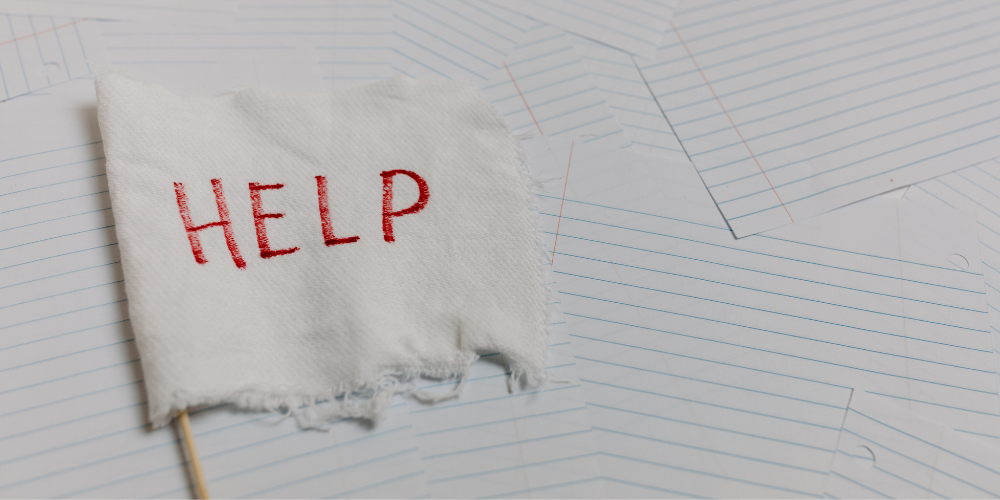 Content Warning: Mental Health, Depression
Content Warning: Mental Health, Depression
I am burned out.
It's ironic to be writing an article on burnout when I'm exhibiting every symptom of burnout in the book, but maybe that's the best way to write it. Write what you know, they said. It will be fun, they said.
Personally, my burnout is the accumulation of over two years of pandemic-heightened stress. Like many of you, my choir abruptly halted all rehearsals on March 12, 2020, with a vague expectation that this whole virus thing would last a couple of weeks, then we'd be back to normal. Well, the joke has been firmly on us.
My choir didn't sing together again that season. We did a virtual choir instead, then tried some isolated outdoor chamber groups over the summer. We planned an outdoor caroling Messiah for December 2020 that was replaced with a Zoom caroling session. Then the Delta variant showed up in early 2021, and everything shut down again for the spring. We shifted to outdoor rehearsals with a vaccination requirement when the weather got nice, which worked pretty well until the snow started to fall. So we moved to a different space with more ventilation and learned to sing 10 feet apart, finally performing the Messiah a year after we planned. Even this spring, we've lost our parent organization. So we're fabricating our own new organization in the middle of an active concert season while combining live-streamed rehearsals, masks, and outdoor performances to keep rehearsals as safe as possible.
All in all, it's been a wild ride. I'm sure many of you have similar tales of your struggles to keep choral music alive in the face of constantly shifting risks, requirements, and setbacks of the Covid-19 pandemic. These tales often feel so ridiculously unlikely that they could be the punchline in a comedian's routine, and I'm sure many of you are just as stressed and exhausted and ready to go back to normal as I am. So how do we know when we've passed the point of stress and entered the realm of burnout?
According to Psychology Today, "Burnout is a state of emotional, mental, and often physical exhaustion brought on by prolonged or repeated stress." Often this stress is work-related; in any given year, over a quarter of the US population experiences work-related burnout, with some professions reporting as high as three quarters. And all sectors have experienced a spike in burnout since the beginning of 2020.
Which is understandable. During the Covid-19 pandemic, even simple tasks like grocery shopping became life-or-death risk evaluation situations. That emotional and mental stress is draining and can eventually cause stress-related fatigue and burnout if it doesn't go away.
 So what does burnout look like? It's different for everyone, but some common indicators are:
So what does burnout look like? It's different for everyone, but some common indicators are:
- Exhaustion and fatigue despite adequate sleep,
- Lowered immunity to common colds and flu,
- Headaches,
- Changes in eating or sleeping patterns,
- Loss of motivation,
- Lack of punctuality,
- Dissociation or detachment,
- Isolation,
- Procrastination,
- Frustration,
- Increased alcohol or drug use, and
- A cynical outlook on life.
Essentially, burnout is different from stress because it is the cumulative effect of too much pressure for far too long. The contrast mostly shows up in your response; stress causes over-engagement, hyperactivity, emotional over-reactivity, and anxiety, while burnout causes detachment, hopelessness, muted emotions, and depression.
Maybe that's why it took me four attempts to write this post and why it's entirely overdue (sorry, Michael!) for publication. The first version was far too dark for a choral blog, while the second sounded like a medical journal with its detachment. Then I got sick twice, and here we are a month later with an article on burnout that's been through almost every symptom (except drugs - drugs are bad, kids) in the burnout book.
If these symptoms resonate with you too, congratulations (or condolences?), you're experiencing burnout. If you're one of the lucky ones who can't relate, take a quick look at the people around you; you almost certainly know someone who is currently exhibiting some of these symptoms.
Interestingly, burnout is a medically recognized syndrome with specific symptoms, an official diagnosis, and multiple treatment plans. But unlike a common cold or infection, it's rarely something we consider going to urgent care to get checked out when it starts to negatively impact the rest of our health and lives.
Mental Health Check: if you feel like you're at the point where your burnout is affecting your life in unmanageable ways, preventing you from eating, sleeping, and socializing, or causing you to use drugs or alcohol to cope, this article will be like eating chicken noodle soup to fight off a rampant infection; you're past the point where home health remedies are enough. Reach out to your doctor or a psychologist instead, or even explore an online service like BetterHealth, Talkspace, or Wellnite, to get some tools to help you recover before things get worse. If it's gotten to the point where you're not sure if life is worth living anymore or have thoughts of killing or harming yourself, that's a big yikes; call the suicide hotline right away at 1-800-273-8255.

If you're a choir person like me trying to keep their head above water or if you're trying to support a person in your organization who's experiencing burnout, here are some ideas to rebalance stress levels for different roles in your choir. Remember, the best way to help anyone avoid or cope with burnout is to talk to them about what they need, what would make their job less stressful, and how to reduce their chronic stress levels. Here are some starting points for those conversations with different participants in your organization.
Director
"How about choral leaders? How do WE stay motivated and moving forward in these less-than-perfect times? Some days I'm fine, and some days I just want to throw in the towel." - 2022 Chorus Connection Covid Survey Respondent
The burnout most likely to impact your choir in harmful ways is that of your director or conductor. Whether you are the choral director, a board member, or a choral administrator, it's essential to take steps to ensure that burnout doesn't cause your beloved figurehead to resign.
So what's causing directors to burn out? There will be dozens of factors unique to your situation, but here are a few to consider:
- Unrecouped loss of time and energy for concerts that have been canceled
- Constantly shifting risk assessment for rehearsals and concerts
- Logistics of safety procedures
- Pressure to perform at a pre-pandemic level after two years of no singing
- Pressure to perform at a pre-pandemic level with fewer singers/more absences
- Pressure to select music that can be adapted to multiple performance types depending on which regulations are in place at performance time
- Conflicting views about Covid-19 policies, resulting in emotionally charged discussions
- Expectations outside of regular skill sets without additional training, including video editing and sound engineering
- Constructing timely responses to current events (e.g., community deaths, BLM, War in Ukraine, etc.) with limited resources and flexibility
- Pressure to provide additional elements, such as rehearsal tracks, sectional rehearsals in smaller groups, live streams, etc., without additional resources
To offset these, remove some of the logistical burdens from your director. Try to:
- Establish a straightforward procedure for what happens when Covid cases in your area reach critical levels to remove decision-making stress from your director
- Offload responsibility for locating masks, taking temperatures, turning on extra ventilation, etc., from your director onto volunteers, section leaders, or Board Members.
- Allow your director to select more accessible or familiar repertoire, or possibly reuse repertoire from canceled concerts, with the understanding that the choir's level may not be what it was before the pandemic until Covid factors resolve
- Define a way of enforcing your choir's Covid-19 policies that doesn't rely on the director being a bouncer
- Find volunteers or contract services to handle video editing, sound engineering, and other elements that are generally not included in your director's training OR offer to pay for your director to receive training in those elements
- Develop a line item for responding to current events and dedicate a small part of your budget to those responses
- Determine which additional elements you will use to offset Covid-19 issues (e.g., rehearsal tracks, live-streamed rehearsals, etc.) and find volunteers or contract professionals to assist with those elements
Essentially, your choir director already has a full plate with their regular directing tasks. Asking them to administer the additional elements of the program added by Covid-19 without further compensation isn't fair and will lead to stress and burnout. It's fine if your director had to do some of these things in the first few months to maintain the program when Covid-19 was an emergency, but we're now two full years into the pandemic. Continuing to operate at emergency stress levels is a perfect recipe for burnout.
Board Members and Staff
"The amount of administrative/non-singing work it takes to have rehearsals and performances has tripled, and we can't seem to motivate additional people to help." - 2022 Chorus Connection Covid Survey Respondent
Board and staff members have often borne the brunt of the pandemic's administrative and logistical challenges. The effects of Covid-19 on running an organization have been complex and unforeseen, resulting in extended periods of stress as the organization rethinks its entire structure and model of operation. About a third of the choirs who responded to the 2022 Chorus Connection Covid Survey have experienced staff turnover in the past two years, which is less than most industries during the Great Resignation but has still caused stress and pressure. In general, your board members and staff may be experiencing stress over:
- Reduced income streams due to canceled concerts, reduced attendance, and reduced participation
- Difficulty fundraising consistently while lockdowns and restrictions affect gathering sizes and procedures
- Meeting new needs for equipment and services not required pre-pandemic (masks, recording equipment, audio editing, etc.)
- Creating new procedures for infectious diseases, performance conditions, and rehearsal requirements
- Adapting to virtual spaces, which choirs previously rarely used
- The nuances of copyright law regarding digital performances, live-streamed rehearsals, etc.
- Turnover and burnout in singers, director, staff, and volunteers
- The impact of the pandemic on community partnerships with other businesses and nonprofits
- Delayed election cycles for new board members due to the pandemic
- Extended periods of rapid change to policies, procedures, and abilities within the organization
While some of these stressors are beginning to ebb as restrictions are lifted, and risks become less intense, there are still ways to further reduce the stress load on your board members and staff.
- Reframe your discussions of post-pandemic recovery in terms of new opportunities for growth in directions you might never have imagined.
- Apply for Covid-related nonprofit funding.
- Apply for a new technology grant specifically to upgrade your equipment to meet the new demands of a post-pandemic world.
- Consider implementing chorus management software to reduce task load via automation.
- Take advantage of online resources to learn necessary skills, such as SoundGym for audio engineering or Youtube tutorials for your live-streaming platforms.
- Base your communicable disease procedures on your local, state, or CDC guidelines to simplify decisions about when to shut down or switch tactics.
- Send a board or staff member to the Chorus America 2022 Convention to learn about what other choruses are doing to cope.
- Ask a copyright lawyer for pro-bono assistance with understanding how to acquire the rights to perform music in the digital space.
- Consider outsourcing accounting, marketing, or other labor-intensive positions to a contractor if your volunteers are overwhelmed.
- Host a Board Retreat this summer to give your board members some focused time to reflect on the changes of the past two years and make some carefully considered decisions about your organization's mission and vision moving forward.
- Allow there to be gaps in your season or reduce season length.
- Allow some plans to fall through without having to jump to plans B, C, D, and E; sometimes, the logistics and timing just don't work out, so let it go and move forward instead of getting caught in a rescheduling loop.
- Shake up the mentality of triage and reactiveness by planning something new, such as a concert in a new venue, a trip, or a big event that includes other nonprofits in your area.
Board members and staff are probably at the most severe risk of burnout. Because the pandemic affected choral organizations so quickly and drastically, many of us have found ourselves stuck in a cycle of continually putting out fires. Giving your board and staff relief from this mentality is the fastest way to reduce that long-term stress and remember why we do this in the first place.
Singers
"[What about] the mental health of performers?" - 2022 Chorus Connection Covid Survey Respondent
Your singers are also likely feeling the strain of the past few years. According to the Chorus Connection 2022 Chorus Covid Survey, over 30% of the choirs that responded indicated that the mental and physical exhaustion of their singers due to the pandemic has negatively impacted their choir's size. Other impacts include reduced punctuality, focus, health, and emotional capacity. Choral singing can be an exhausting (albeit fulfilling!) experience, and if your singers are already experiencing burnout in other life areas, singing in a choir may seem impossible right now. Here are some red flags to watch for in your singers:
- Financial stress, including an inability to pay dues or buy uniforms
- Emotional fatigue preventing connection with the music
- Chronic or increased tardiness or leaving rehearsals early
- Unnecessary isolation during breaks or other social time
- Ghosting, e.g., committing to a performance then vanishing without notice or reason
- Frustration and doubts about the ability to learn music
- Underconfidence or a sense of going through the motions from singers who were previously confident or excited to participate
- Unexplained decreasing volunteerism for board positions or other needs
To reduce stress on your singers, try some or all of the following:
- Offer a self-selecting, no-questions-asked discount on dues/uniforms, or offer to let any choir member cover their dues/uniforms with volunteer time
- Try a simple icebreaker or other activity at the beginning of rehearsal breaks to encourage interaction with those who are feeling isolated
- Take a moment during rehearsals to collectively brainstorm the emotional intent of each piece with your singers through a word cloud or Somatic Resourcing
- Program easier, fun music to set your singers up for success with notes, rhythms, and languages, then spend more time developing the emotional and contextual elements
- Shake up routines and create excitement by changing your performance venue, adding a performance outdoors, combining efforts with another nonprofit to create a bigger event, etc.
- Be specific in your asks for volunteers, and spread out tasks among more people to reduce any sense of overwhelming responsibility
- Be very clear about expectations, procedures, dates and times, etc. to eliminate the stress of uncertainty as much as possible, or
- Consider adding an additional dress/tech rehearsal in your performance space with all concert elements in place to reduce performance stress.
Keep in mind that the cause of your singers' burnout may have nothing to do with choir or that they may even be fighting burnout in other areas of their lives by participating in choir. In those cases, the best you can do is give them as stress-free an experience as possible. Be kind, be supportive, and accept that some people's bests may not look the same now as they did pre-pandemic. That includes gracefully acknowledging that even your best singers may need some away; check up on them, let them know they are missed but don't pressure them. They'll return in their own time.
Are you or other members of your choral organization experiencing burnout? What tricks and tips have you found to minimize the effects of burnout on your organization? Share your experience with the community in the comments below!

Stephanie Helleckson's parents met in a choir, and her entire family has been choir nerds ever since. Having sung under nearly 50 different conductors while living in Alaska, Hawaii, Florida, and Colorado and having conducted several choirs herself, she is a strong advocate for using choral music as a tool to bridge gaps between people, social groups, and cultures. She currently lives in Paonia, Colorado, where she directs the North Fork Community Chorus, teaches voice and violin, and manages her own writing and editing business. When not singing or writing, she can usually be found hiking in a National Park, kayaking down a new river, or experimenting with new flavors in the kitchen.

